一般将来时讲解与练习(有答案)
(完整版)一般将来时态讲解及练习和答案
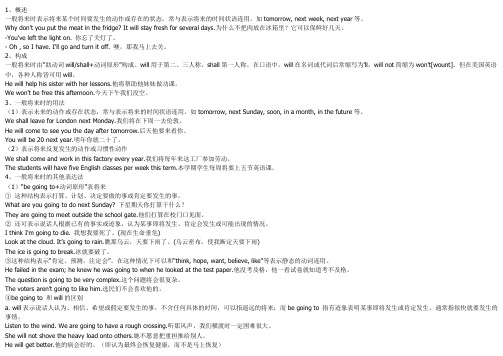
1、概述一般将来时表示将来某个时间要发生的动作或存在的状态,常与表示将来的时间状语连用,如tomorrow, next week, next year等。
Why don’t you put the meat in the fridge? It will stay fresh for several days.为什么不把肉放在冰箱里?它可以保鲜好几天。
-You've left the light on. 你忘了关灯了。
- Oh , so I have. I'll go and turn it off. 噢,那我马上去关。
2、构成一般将来时由“助动词will/shall+动词原形”构成。
will用于第二、三人称,shall第一人称。
在口语中,will在名词或代词后常缩写为'll,will not简缩为won’t[wount]。
但在美国英语中,各种人称皆可用will。
He will help his sister with her lessons.他将帮助他妹妹做功课。
We won't be free this afternoon.今天下午我们没空。
3、一般将来时的用法(1)表示未来的动作或存在状态,常与表示将来的时间状语连用,如tomorrow, next Sunday, soon, in a month, in the future等。
We shall leave for London next Monday.我们将在下周一去伦敦。
He will come to see you the day after tomorrow.后天他要来看你。
You will be 20 next year.明年你就二十了。
(2)表示将来反复发生的动作或习惯性动作We shall come and work in this factory every year.我们将每年来这工厂参加劳动。
一般将来时(讲义及答案)
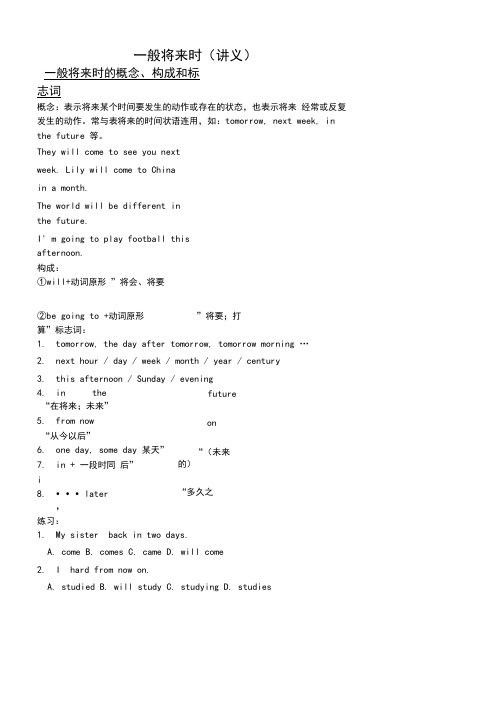
一般将来时(讲义)一般将来时的概念、构成和标志词概念:表示将来某个时间要发生的动作或存在的状态,也表示将来 经常或反复发生的动作。
常与表将来的时间状语连用,如:tomorrow, next week, inthe future 等。
They will come to see you nextweek. Lily will come to Chinain a month.The world will be different inthe future.I' m going to play football thisafternoon.构成:①will+动词原形 ”将会、将要②be going to +动词原形 ”将要;打算”标志词:1. tomorrow, the day after tomorrow, tomorrow morning…2. next hour / day / week / month / year / century3. this afternoon / Sunday / evening4. in the “在将来;未来”5. from now “从今以后”6. one day, some day 某天”7. in + 一段时同 后” i8. •••later ,练习:1. My sister back in two days.A. comeB. comesC. cameD. will come2. I hard from now on.A. studiedB. will studyC. studyingD. studies futureon“(未来的)“多久之3.后天Tcm将要离开北京-(翻径)_____________________4.中国将会变得更强大,(翻修)______________________5.They will visit Zhengzhou next month.(写出同义句)6.When will you leave for China (写出同义句)When you句式变换She will be angry with him.否定句:She will not be angry with him. /She won, t be angry with him. 一般疑问句:Will she be angry with him 回答:Yes, she will. / No, shewon , t.特殊疑问句:Who will she beangry with注意:will可缩写为'11, will not可缩写为won' t /wa u nt/练习:1.这个周末他不会去钓鱼。
七年级英语一般将来时练习题40题含答案解析

七年级英语一般将来时练习题40题含答案解析1.We are going to have a picnic this Sunday. What about you?I am going to ______ my grandparents.A.visitB.visitsC.visitedD.visiting答案解析:A。
be going to 后面接动词原形,表示计划、打算做某事。
B 选项是第三人称单数形式;C 选项是过去式;D 选项是现在分词,都不符合be going to 的用法。
2.My mother is going to buy some fruit. She is going to the ______.A.supermarketB.hospitalC.libraryD.school答案解析:A。
妈妈买水果通常会去超市。
B 选项医院是看病的地方;C 选项图书馆是借书、看书的地方;D 选项学校是学习的地方。
3.Tom is going to play football tomorrow. He is very ______.A.excitedB.sadC.angryD.tired答案解析:A。
要去踢足球通常会很兴奋。
B 选项悲伤;C 选项生气;D 选项累,都不符合语境。
4.We are going to have an English test next week. I am going to study ______.A.hardB.hardlyzyzily答案解析:A。
study hard 努力学习。
B 选项hardly 是几乎不的意思;C 选项lazy 是懒惰的;D 选项lazily 是懒惰地,都不符合语境。
5.My sister is going to be a doctor. She is going to study ______.A.mathB.scienceC.artD.music答案解析:B。
一般将来时习题及答案解析

一般将来时习题及答案解析一般将来时是英语语法中的一个重要时态,用来表示将来发生的动作或状态。
在学习一般将来时时,我们需要掌握一些基本的规则和习题。
本文将通过一些典型的习题及其答案解析,帮助读者更好地理解和运用一般将来时。
1. 习题:将下列动词的适当形式填入空白处。
a) I ______ (go) to the cinema tomorrow.b) They ______ (have) a party next weekend.c) She ______ (not come) to the meeting.d) We ______ (visit) our grandparents next month.答案解析:a) will gob) will havec) will not comed) will visit在一般将来时中,主语加上助动词"will",再加上动词的原形,即可构成将来时的肯定句。
否定句的构成为:主语 + will not + 动词原形。
2. 习题:根据句子意思,选择正确的动词形式。
a) I think it ______ (rain) tomorrow.b) She ______ (not go) to the party if she is tired.c) They ______ (play) football if the weather is good.d) We ______ (not have) a picnic if it is cold.答案解析:b) will not goc) will playd) will not have在一般将来时中,我们可以使用"will"来表示预测、意愿或承诺等。
根据句子的意思,我们可以选择合适的动词形式。
3. 习题:根据句子的时间状语,选择正确的动词形式。
a) They ______ (arrive) at the airport at 8 o'clock tomorrow.b) She ______ (leave) for London next Monday.c) We ______ (start) the meeting in five minutes.d) He ______ (finish) his homework before dinner.答案解析:a) will arriveb) will leavec) will startd) will finish在一般将来时中,有时候我们需要根据句子的时间状语来选择正确的动词形式。
一般将来时讲解及练习(含答案)
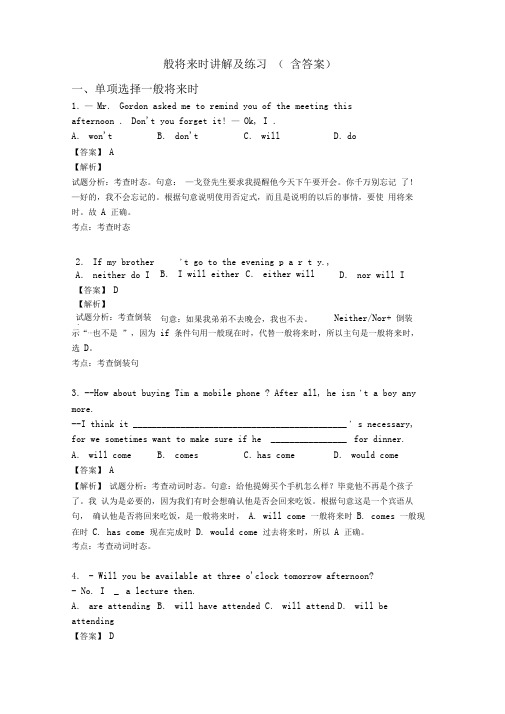
般将来时讲解及练习(含答案)一、单项选择一般将来时1.—Mr.Gordon asked me to remind you of the meeting thisafternoon .Don't you forget it! —Ok, I .A.won't B.don't C.will D.do【答案】A【解析】试题分析:考查时态。
句意:—戈登先生要求我提醒他今天下午要开会。
你千万别忘记了!—好的,我不会忘记的。
根据句意说明使用否定式,而且是说明的以后的事情,要使用将来时。
故A 正确。
考点:考查时态2.If my brother doesn 't go to the evening p a r t y.,A.neither do I B.I will either C.either willI D.nor will I【答案】D 【解析】试题分析:考查倒装句:句意:如果我弟弟不去晚会,我也不去。
Neither/Nor+ 倒装句,表示“⋯也不是”,因为if 条件句用一般现在时,代替一般将来时,所以主句是一般将来时,选D。
考点:考查倒装句3.--How about buying Tim a mobile phone ? After all, he isn 't a boy any more.--I think it _____________________________________________ ' s necessary, for we sometimes want to make sure if he ________________ for dinner. A.will come B.comes C.has come D.would come【答案】A【解析】试题分析:考查动词时态。
句意:给他提姆买个手机怎么样?毕竟他不再是个孩子了。
我认为是必要的,因为我们有时会想确认他是否会回来吃饭。
初中英语主要时态系列——一般将来时讲解及练习【附中考真题及解析】
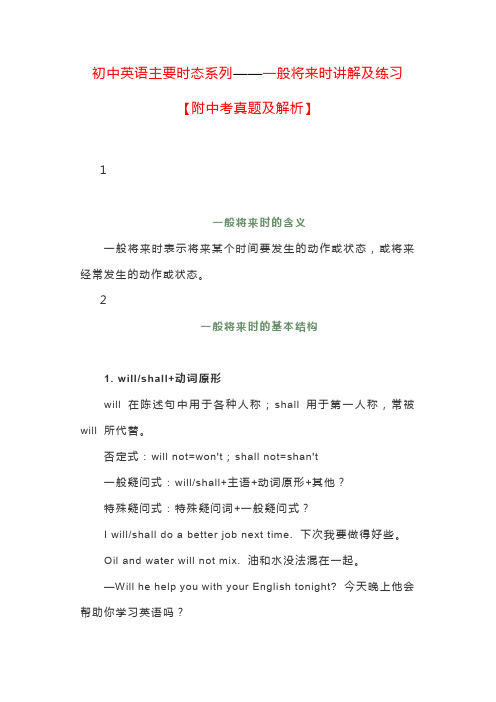
初中英语主要时态系列——一般将来时讲解及练习【附中考真题及解析】1一般将来时的含义一般将来时表示将来某个时间要发生的动作或状态,或将来经常发生的动作或状态。
2一般将来时的基本结构1. will/shall+动词原形will 在陈述句中用于各种人称;shall用于第一人称,常被will 所代替。
否定式:will not=won't;shall not=shan't一般疑问式:will/shall+主语+动词原形+其他?特殊疑问式:特殊疑问词+一般疑问式?I will/shall do a better job next time. 下次我要做得好些。
Oil and water will not mix. 油和水没法混在一起。
—Will he help you with your English tonight? 今天晚上他会帮助你学习英语吗?—Yes, he will./No, he won't. 是的,他会。
/不,他不会。
—When will you arrive for America? 你什么时候去美国?—Tomorrow. 明天。
2. am/is/are going to +动词原形否定式:am/is/are not going to +动词原形一般疑问式:am/is/are +主语+ going to + 动词原形+其他?特殊疑问式:特殊疑问词+一般疑问式?He is going to spend his holidays in London. 他打算在伦敦度假。
Look at the dark clouds. There is going to be a storm. 看那乌云,快要下雨了。
Is he going to collect any data for us? 他会帮我们收集数据吗?What are you going to do tomorrow? 明天你打算作什么?3一般将来时的用法will+动词原形与am/is/are going to +动词原形的用法虽然都表示将来发生动作或情况,一般情况下能互换。
初一英语一般将来时练习题20题带答案解析

初一英语一般将来时练习题20题带答案解析1.She ______ visit her grandparents this weekend.A.willB.is going toC.wouldD.was going to答案解析:A 和B 选项都可以表示一般将来时,C 选项would 通常用于过去将来时或者委婉语气,D 选项was going to 是过去将来时。
根据this weekend 可知要用一般将来时,而“will + 动词原形”和“be going to + 动词原形”都可以表示一般将来时,没有特别的迹象表明有计划,所以A 和B 都可以,但本题最佳答案是A。
2.We ______ have a picnic if the weather is fine.A.willB.is going toC.wouldD.were going to答案解析:A 和B 选项都可以表示一般将来时,C 选项would 通常用于过去将来时或者委婉语气,D 选项were going to 是过去将来时。
如果天气好我们将会去野餐,这里没有特别的计划,所以用“will + 动词原形”,答案是A。
3.He ______ play football tomorrow.A.willB.is going toC.wouldD.was going to答案解析:A 和B 选项都可以表示一般将来时,C 选项would 通常用于过去将来时或者委婉语气,D 选项was going to 是过去将来时。
根据tomorrow 可知要用一般将来时,没有特别的计划,所以用“will + 动词原形”,答案是A。
4.They ______ go to the zoo on Sunday.A.willB.is going toC.wouldD.were going to答案解析:A 和B 选项都可以表示一般将来时,C 选项would 通常用于过去将来时或者委婉语气,D 选项were going to 是过去将来时。
四年级英语一般将来时练习40题含答案解析
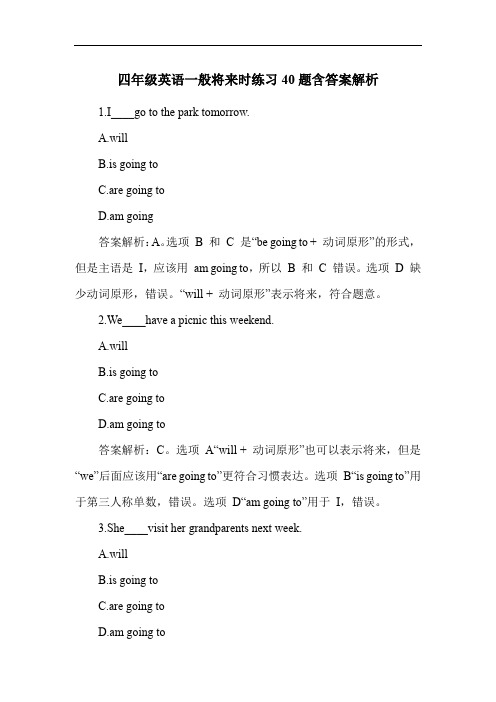
四年级英语一般将来时练习40题含答案解析1.I____go to the park tomorrow.A.willB.is going toC.are going toD.am going答案解析:A。
选项B 和C 是“be going to + 动词原形”的形式,但是主语是I,应该用am going to,所以B 和C 错误。
选项D 缺少动词原形,错误。
“will + 动词原形”表示将来,符合题意。
2.We____have a picnic this weekend.A.willB.is going toC.are going toD.am going to答案解析:C。
选项A“will + 动词原形”也可以表示将来,但是“we”后面应该用“are going to”更符合习惯表达。
选项B“is going to”用于第三人称单数,错误。
选项D“am going to”用于I,错误。
3.She____visit her grandparents next week.A.willB.is going toC.are going toD.am going to答案解析:B。
主语是she,第三人称单数,应该用“is going to + 动词原形”。
选项A“will + 动词原形”也可以,但此处“is going to”更符合习惯。
选项C 和D 分别用于复数和I,错误。
4.They____play football on Sunday.A.willB.is going toC.are going toD.am going to答案解析:C。
主语是they,复数,应该用“are going to + 动词原形”。
选项A“will + 动词原形”也可以,但此处“are going to”更符合习惯。
选项B 用于第三人称单数,错误。
选项D 用于I,错误。
5.I____read a book this evening.A.willB.is going toC.are going toD.am going答案解析:A。
一般将来时讲解(附习题+答案)

一般将来时讲解(附习题+答案)一、一般将来时的含义:表示动作发生在将来二、一般将来时的句型:(1) will/shall+动词原形(2) be going to+动词原形三、一般将来时的时间状语:tomorrow(明天)、the day after tomorrow(后天)、next...(下一...): next week(下一周)、next year(明年)、next month(下个月)in+一段时间(...之后): in three days(三天之后)、in the future在未来this evening(今天晚上)四、一般将来时的句型结构:(1) will/shall+动词原形(will not =won’t)(will 各种人称均可用,shall 只能用于第一人称)1)肯定句:主语+will/shall+动词原型...如:I will go to school tomorrow.我明天将会去学校He will go to school tomorrow.他明天将会去学校。
2)否定句:主语+will/shall+not+动词原型...如:I won’t go to school tomorrow.我明天将不会去学校。
He won’t go to school tomorrow.他明天将不会去学校。
3)一般疑问句:Will/Shall +主语+动词原型...如:Will you go to school tomorrow?你明天要去学校吗?Will he go to school tomorrow?他明天要去学校吗?肯定回答:Yes, 主语+will.如:Yes, I will.Yes, he will.否定回答:No,主语+will+not.如:No, I won’t.No, he won’t.4) 特殊疑问句:特殊疑问词+will/shall+主语+动词原型...如:What will you do tomorrow?你明天将会做什么?What will he do tomorrow?他明天将会做什么?(2) be going to+动词原形1)肯定句:主语+be going to +动词原型...如:I am going to buy some books tomorrow.我明天打算去买一些书。
一般将来时(附讲义和答案)
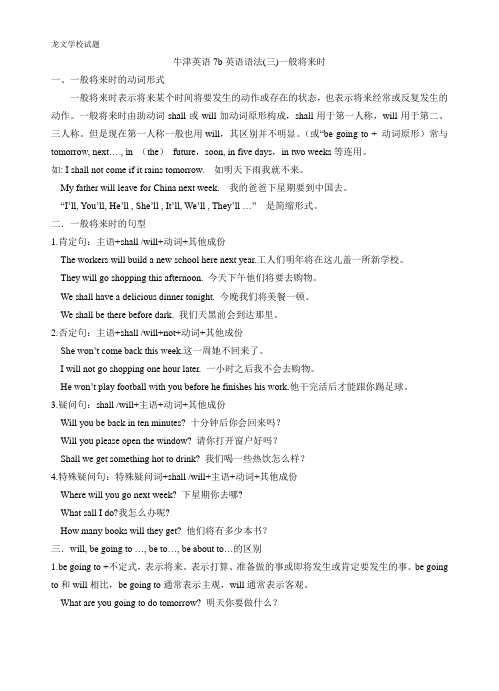
牛津英语7b英语语法(三)一般将来时一、一般将来时的动词形式一般将来时表示将来某个时间将要发生的动作或存在的状态,也表示将来经常或反复发生的动作。
一般将来时由助动词shall或will加动词原形构成,shall用于第一人称,will用于第二、三人称。
但是现在第一人称一般也用will,其区别并不明显。
(或“be going to + 动词原形)常与tomorrow, next… , in (the)future,soon, in five days,in two weeks等连用。
如: I shall not come if it rains tomorrow.如明天下雨我就不来。
My father will leave for China next week.我的爸爸下星期要到中国去。
“I’ll, You’ll, He’ll , She’ll , It’ll, We’ll , They’ll …”是简缩形式。
二.一般将来时的句型1.肯定句:主语+shall /will+动词+其他成份The workers will build a new school here next year.工人们明年将在这儿盖一所新学校。
They will go shopping this afternoon. 今天下午他们将要去购物。
We shall have a delicious dinner tonight. 今晚我们将美餐一顿。
We shall be there before dark. 我们天黑前会到达那里。
2.否定句:主语+shall /will+not+动词+其他成份She won’t come back this week.这一周她不回来了。
I will not go shopping one hour later. 一小时之后我不会去购物。
He won’t play football with you before he finishes his work.他干完活后才能跟你踢足球。
初中一般将来时讲义【含答案】
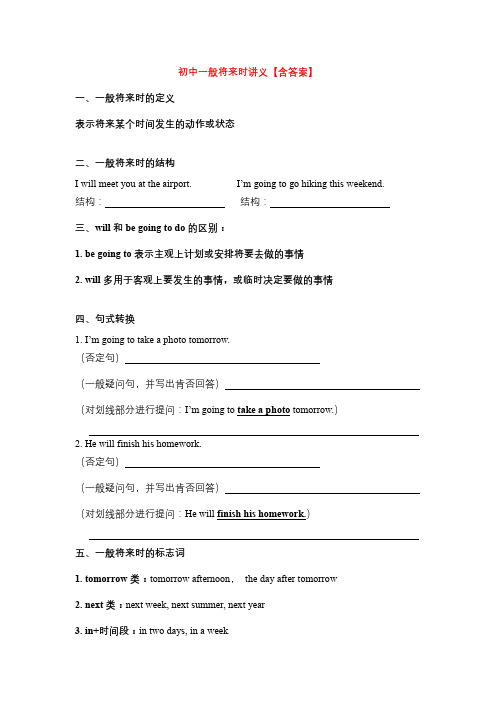
初中一般将来时讲义【含答案】一、一般将来时的定义表示将来某个时间发生的动作或状态二、一般将来时的结构I will meet you at the airport. I’m going to go hiking this weekend.结构:结构:三、will和be going to do的区别:1. be going to表示主观上计划或安排将要去做的事情2. will多用于客观上要发生的事情,或临时决定要做的事情四、句式转换1. I’m going to take a photo tomorrow.(否定句)(一般疑问句,并写出肯否回答)(对划线部分进行提问:I’m going to take a photo tomorrow.)2. He will finish his homework.(否定句)(一般疑问句,并写出肯否回答)(对划线部分进行提问:He will finish his homework.)五、一般将来时的标志词1. tomorrow类:tomorrow afternoon,the day after tomorrow2. next类:next week, next summer, next year3. in+时间段:in two days, in a week4.其他:in the future, one day, someday【课堂练习】1. We don’t know when __________ next week. Please call me when he arrives.A. will he arriveB. does he arriveC. he will arriveD. he arrives2. —How soon will he come back to Guangzhou?—I have no idea. Maybe he __________ in one or two days.A. will comeB. comesC. comeD. came3. ---will the train arrive?---It the station in 50 minutes.A. How soon; will get toB. How soon; arriveC. How long; will reachD. How far; gets to4. Will you at the bus stop at 10:30?A. meetingB. meetsC. meetD. met5. Lily and I to the concert it we free next week.A. go; areB. go; will beC. will go; will beD. will go; are初中一般将来时讲义(答案)一、一般将来时的定义表示将来某个时间发生的动作或状态二、一般将来时的结构I will meet you at the airport. I’m going to go hiking this weekend.结构:will+动词原形结构:am/is/are going to+动词原形三、will和be going to do的区别:1. be going to表示主观上计划或安排将要去做的事情2. will多用于客观上要发生的事情,或临时决定要做的事情四、句式转换1. I’m going to take a photo tomorrow.(否定句)I’m not going to take a photo tomorrow.(一般疑问句,并写出肯否回答)---Are you going to take a photo tomorrow?---Yes, I am. / No, I’m not.(对划线部分进行提问:I’m going to take a photo tomorrow.)What are you going to do tomorrow?2. He will finish his homework.(否定句)He will not finish his homework.(一般疑问句,并写出肯否回答)---Will he finish his homework?---Yes, he will. /No, he won’t.(对划线部分进行提问:He will finish his homework.)What will he do?五、一般将来时的标志词1. tomorrow类:tomorrow afternoon,the day after tomorrow2. next类:next week, next summer, next year3. in+时间段:in two days, in a week4.其他:in the future, one day, someday【课堂练习】1. We don’t know when __________ next week. Please call me when he arrives.A. will he arriveB. does he arriveC. he will arriveD. he arrives2. —How soon will he come back to Guangzhou?—I have no idea. Maybe he __________ in one or two days.A. will comeB. comesC. comeD. came3. ---will the train arrive?---It the station in 50 minutes.A. How soon; will get toB. How soon; arriveC. How long; will reachD. How far; gets to4. Will you at the bus stop at 10:30?A. meetingB. meetsC. meetD. met5. Lily and I to the concert it we free next week.A. go; areB. go; will beC. will go; will beD. will go; are。
初一英语一般将来时练习题20题含答案解析
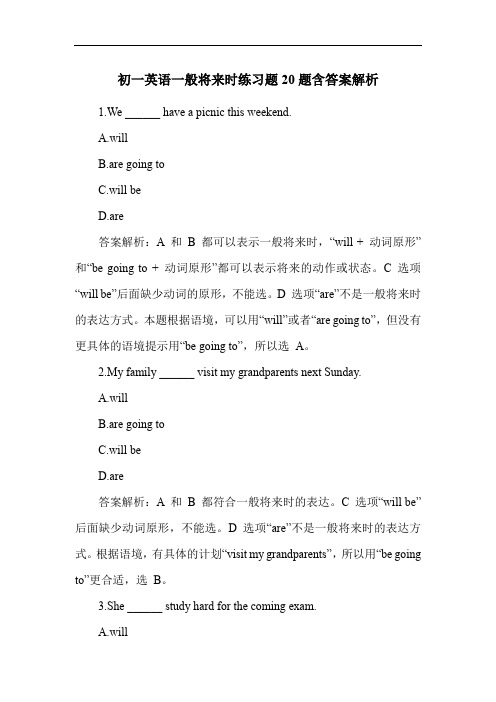
初一英语一般将来时练习题20题含答案解析1.We ______ have a picnic this weekend.A.willB.are going toC.will beD.are答案解析:A 和B 都可以表示一般将来时,“will + 动词原形”和“be going to + 动词原形”都可以表示将来的动作或状态。
C 选项“will be”后面缺少动词的原形,不能选。
D 选项“are”不是一般将来时的表达方式。
本题根据语境,可以用“will”或者“are going to”,但没有更具体的语境提示用“be going to”,所以选A。
2.My family ______ visit my grandparents next Sunday.A.willB.are going toC.will beD.are答案解析:A 和B 都符合一般将来时的表达。
C 选项“will be”后面缺少动词原形,不能选。
D 选项“are”不是一般将来时的表达方式。
根据语境,有具体的计划“visit my grandparents”,所以用“be going to”更合适,选B。
3.She ______ study hard for the coming exam.A.willB.are going toC.will beD.are答案解析:A 选项“will”表示主观意愿,符合语境。
B 选项“are going to”主语是she 时应该用“is going to”,所以不能选。
C 选项“will be”后面缺少动词原形,不能选。
D 选项“are”不是一般将来时的表达方式。
所以选A。
4.They ______ play basketball after school.A.willB.are going toC.will beD.are答案解析:A 和B 都符合一般将来时的表达。
C 选项“will be”后面缺少动词原形,不能选。
一般将来时详解及练习

it'll,we'll,you'll,they'll。
'll,并与主语连写在一起,如:I'll,he'll,注:will 常简略为一、定义:表示将要发生的动作或存在的状态及打算、计划或准备做某事。
二、基本构成:①be going to +do.打算做某事一般将来时态:eg:I’m going to be a singer.我打算成为一名歌手。
She is going to learnEnglish.她打算去学习英语。
②will /shall +动词原形这种方法一般单纯地表示将来某个时间将要发生的动作或存在的状态。
will 用于各种人称;shall 只用于第一人称。
eg:I will /shall go to visit him next week.下周我将去拜访他。
What time shall we go there tomorrow?明天我们几点去那儿?③否定句:在be动词(am,is,are)后加not或情态动词will后加not构成won’t。
例如:I’m going to have a picnic this afternoon.→I’m not going to have a picnic this afternoon.④一般疑问句:be或will提到句首,some改为any,and改为or,第一二人称互换。
例如:We are going to go shopping this weekend.→Are you going to go shopping this weekend?⑤对划线部分提问:一般情况,一般将来时的对划线部分有三种情况。
1、问人。
Who例如:I’m going to New York soon.→Who’s going to New York soon?2、问干什么。
What…do例如:My father is going to watch football games with methis afternoon.→What is your father going to do with you this afternoon?3、问什么时候。
(英语)高中英语一般将来时解题技巧讲解及练习题(含答案)及解析

(英语)高中英语一般将来时解题技巧讲解及练习题(含答案)及解析一、单项选择一般将来时1.If Kate goes to the gym this weekend, _______.A.so do I B.so I doC.so will I D.so I will【答案】C【解析】试题分析:句意:如果凯特这个周末去体育馆,我也去。
If引导的条件状语从句用一般现在时态表示一般将来时态,主句用一般将来时态;又因为前句说Kate去体育馆,后句说I也去体育馆,故用全部倒装。
故选C。
考点:考查时态和全部倒装句。
2.The students have been working hard on their lessons and their efforts _____ with success in the end.A.rewarded B.were rewardedC.will reward D.will be rewarded【答案】D【解析】【分析】【详解】本题考查时态和语态。
解题步骤:1. 确定时态:根据句尾的in the end可知,事情发生在将来,用将来时。
2. 确定语态:efforts和reward是被动关系,应该使用被动语态。
句意:学生们一直在刻苦学习功课,他们的努力终将会得到回报。
综上,用一般将来时的被动,故选D。
【点睛】一般将来时1. 表示未来的动作或状态常用will / shall + 动词(常与表示将来的时间状语边用如tomorrow、next week等)。
2. 表示一种趋向或习惯动作。
例如:We’ll die without air or water.3. 表示趋向行为的动词如come, go, start, begin, leave等词常用进行时的形式表示将来时。
4. be going to与will / shall, be to do, be about to do用法及区别:(1)shall / will do表示未事先考虑过,即说话时临时作出的决定。
【一般将来时】全国通用(含答案及详细解析)
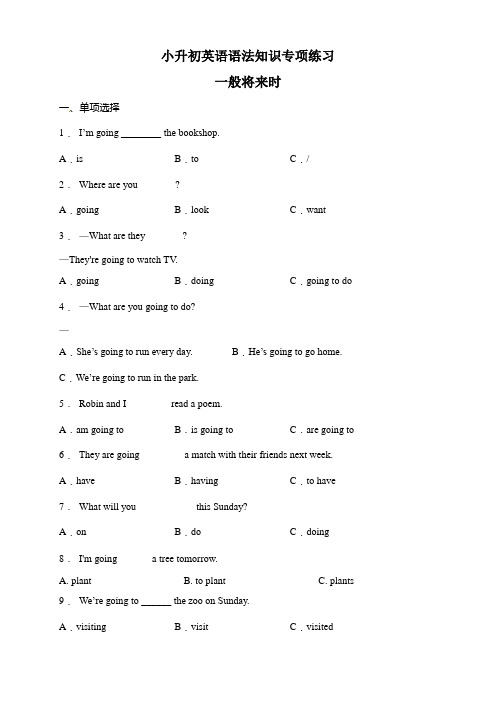
小升初英语语法知识专项练习一般将来时一、单项选择1.I’m going ________ the bookshop.A.is B.to C./ 2.Where are you _______?A.going B.look C.want 3.—What are they _______?—They're going to watch TV.A.going B.doing C.going to do 4.—What are you going to do?—________A.She’s going to run every day.B.He’s going to go home. C.We’re going to run in the park.5.Robin and I ________ read a poem.A.am going to B.is going to C.are going to 6.They are going ________ a match with their friends next week. A.have B.having C.to have 7.What will you ___________ this Sunday?A.on B.do C.doing8.I'm going ______ a tree tomorrow.A. plantB. to plantC. plants 9.We’re going to ______ the zoo on Sunday.A.visiting B.visit C.visited10.There __________ a sports meeting in the playground next Monday.A. is going to haveB. will haveC. is going to be 11.If you _________ work hard, you _________ pass the exam.A. won't, won'tB. won't, can'tC. don't, don'tD. don't, won't 12.What are you ________ to do this afternoon?A.going B.go C.goes 13.Daming and Si mon ____ to America next year.A. goesB. aregoing C. went D. go14.We are going _______.A.seeing ducks B.to see ducks C.to see duck 15.We ______have a football match tomorrow.A. are goingB. are go toC. are going to 16.—______ are they going to____ tomorrow?—They are going to have a party.A.When; doB.What; goC.What; do17.________ you pick peaches?A.Will B.Are C.Is18.—What are you going to do on Saturday?—________A.I’m going to see my grandparents.B.I see my grandparents. 19.Xiaoyong is going to ________ in the park.A.running B.run C.runs20.Mary is going to check her email ________.21.What are you ________ to buy this afternoon?A.going B.go C.goes22.I _______ buy a new hat.A.be going to B.going to C.am going D.am going to 23.I’m ________ the bookstore this afternoon ________ bus.A.going; by B.going; by a C.going to; by D.go to; in a 24.My family _______ going to get together this evening.A.are B.will C.am25.I'm going to buy a comic book ________.A.on Sundays B.next week C.yesterday 26.The friend s in Grade 6 _______ going to say goodbye.A.is B.are C.will27.I’m _________ to bring back some sausages for you!A.going B.goes C.go28.She is going to take a trip ________.A.next week B.yesterday C.last Friday 29.What ________ you ________ to do this afternoon?A.are; going B.do; do C.about; go 30.—When are you going to the Summer Palace?—________A.Three days ago. B.This afternoon. C.Every Sunday. D.Last year. 31.I am _______ eat breakfast at 7:15.A.going to B.will C.to D.for32.I _____ the Great Wall next year.A.go to visit B.will visit C.visited33.—Where are you going this afternoon?—________.A.I'm doing my homework B.I'm going to the bookstoreC.I'm going there by bike34.—Where is Tom going?—He ______ the shop.A.is going B.is going to C.is go to35.—_______ be hot?—Yes, _______.A.W ill; is it B.Will it; it will C.Will; it won't D.Will it; it is 36.Jill ________ wear glasses in the future.A.won’t B.doesn’t C.isn’t37.In the future, the computers ________ us see dinosaurs in class.A.help B.helped C.will help D.to help38.The Chinese space station ________ ready in 2022.A.will be B.gets39.I’m going to swim ______.A.now B.yesterday C.tomorrow40.________ you going to run?A.Are B.Is C.Do41.—________ are you going to do?—I’m going to swim.A.Who B.What C.Where42.—What's the weather _______ like in Xi'an?—It will be snowy.A.is going to be B.go to be C.going to be43.They will _______ the dining room.A.decorating B.decorates C.decorate44.How are you ________ celebrate?A.go to B.going to C.will to D./45.— your father you to the park tomorrow?—Yes, tomorrow is Sunday.A. Do, takeB. Did, takeC. Will, take46.We’re going ________ visit them.A.to B.too C.two47.—What are you going to do this afternoon?—________.A.I'm going to buy a book B.I'm a student C.I'm going to school by bike 48.—Where are you going this afternoon?—________A.I’m going to buy some books.B.I’m going to the bookstore.C.Can I help you? D.I’m going to visit my aunt.49.It will ______ in Beijing.A.be sunny B.sun C.sunning50.—Where ______ you ______?—I am going home.A.are; go B.are; going C.are; do一般将来时(参考答案)一、单项选择1.【答案】B【解析】句意:我将要去书店。
【英语】一般将来时讲解及练习(含答案)

【英语】一般未来时解说及练习(含答案)一、单项选择一般未来时1.---- James, do you know it’ s Kate’ s birthday tomorrow?---- Really? I ______ her a present after work this afternoon.A. will buy C. am buying B.am going to buy D. am to buy【答案】A【分析】试题剖析:观察时态。
句意:杰姆斯,你知道明日是凯特的诞辰吗?真的吗?我今日下午下班后会给他买一个礼品。
买礼品的动作未来某一时辰做的事情,用一般未来时。
应选A。
考点:观察时态。
2.However hard he tries, the recorder.A. didn ’ t work B. won’ t work C. isn ’ t working D. hasn ’ t worked 【答案】 B【分析】试题剖析:观察will 用法。
句意:不论他多么努力试试,这个录音机就不工作了。
此题中的 will 表示的是一种偏向性,如 The door won ’t open故. B 正确。
考点:观察 will 用法评论:神态动词 will 有多种不一样的用法, will 能够表示暂时决定做某事;或许表示未来时。
3.If my brother doesn A. neither do I’ t go to the evening party,.B. I will either C. either will I D. nor will I【答案】 D【分析】试题剖析:观察倒装句:句意:假如我弟弟不去晚会,我也不去。
Neither/Nor+倒装句,表示“ 也不是”,由于 if 条件句用一般此刻时,取代一般未来时,所以主句是一般未来时,选 D。
考点:观察倒装句4. Japan ’ s economy _______ in the past twenty years. No one knows how long it ______ before it regains its increase.A. has been declining; will be C. had been in decline; would take 【答案】 A B.has declined; would be D. was on the decline; will take【分析】试题剖析:观察动词的时态和语态,。
- 1、下载文档前请自行甄别文档内容的完整性,平台不提供额外的编辑、内容补充、找答案等附加服务。
- 2、"仅部分预览"的文档,不可在线预览部分如存在完整性等问题,可反馈申请退款(可完整预览的文档不适用该条件!)。
- 3、如文档侵犯您的权益,请联系客服反馈,我们会尽快为您处理(人工客服工作时间:9:00-18:30)。
一般将来时一.一般将来时的定义:-表:将来某一个时间将要发生的动作或存在的状态,也表示将来经常或重复发生的动作.表:将来某一个时间将要发生的动作或存在的状态,也表示将来经常或重复发生的动作.二.一般将来时的标志:tomorrow (明天),the day after tomorrow(后天)n ext year 明年)n ext mon th下一个月) next Week下一个星期)三.一般将来时的构成:1. 主语+be(am,is,are) going to动词原形+ .例如:⑴.1 am going to PIay football tomorrow.明天我将要踢足球.(2).She is going to WatCh a movie the day after tomorrow.后天她要看一场电影.2■主语+will∕shall+动词原形+■■…** *** 说明:(1).will/Shall 有时可以和be going to 互换;(2) .will是万能的,shall只能用在第一人称,主语是l,we.(3) .will和shall的后面接动词原形)例如:(1).1 shall/will go to Beijing next month.(I will=I'll)下个月我将要去北京.(2) .You will come to See me tomorrow.(you will=you'll)明天你将要来看我.(3) .She will read English tomorrow morning.(She will=She'll) 明天早上她将要读英语.3. be to + 动词原形。
表示一种常规性的活动或注定要做的事情。
如:Who is to clean the classroom today? 今天该谁打扫教室了?When are you to return your library book? 你什么时候要还图书?The bridge is to be comPleted by the end of this year. 这渡桥该在今年年底前完工。
4. be about to + 动词原形。
表示就要做或正好要做的事情。
往往暗含一种时间上的巧合,因此,句子不能再用时间状语。
如:Don 't leave. Li Lei is about to come. 不要走了,李蕾就要来了。
Be quiet. The concert is about to start. 安静下来,音乐演唱会就要开始了。
四.句一般将来时的式:1. 肯定句:(1)..主语+be(am,is,are) going to■动词原形 +⑵.主语+will∕shall+动词原形+..… 例句和上面一样,就不举了.2. 否定句:(1)..主语+be(am,is,are) not going to+动词原形+ .....例女口:(A): I am not going to PIay basketball tomorrow.明天我不将踢足球.(B). She is not/isn't going to ViSit Shanghai next year.明年她不将参观上海.⑵.主语+will/shall not+动词原形+..…(A) . I shall not go to school the day after tomorrow。
后天我不将上学了(B) . I will not write my homework this evening.(will notl=I won't) 今晚我不将写作业(C) . She will not see a movie next week.(will not=won't) 下个星期她将不看一场电影.3. 一般疑问句:(1).Am∕ls,Are+ 主语+goi ng to+动词原形+.... 例如(A). --Am I going to see my grandfather tomorrow?明天我将去看我的爷爷吗?--Yes,you are. 是的,你将去.(B) .-- Are you going to listening to the taPe tomorrow?明天你将听录音带吗?---No,I am not.不,我不将.(C) . --Is she going to Beijing next year? 明年我将去北京吗?--Yes,she is. 是的,她将.(2).Will//shall+ 主语+动词原形+...例如(A). --Shall we Play volleyball next class? 下一节课我们将打排球吗--Yes,you will. 是的,你们将. No,you won't(B) . --Will you come here next week? 下个星期你将来这儿吗?--Yes,I will. 是的,我将. No,I won'.t(C) .--Will she teach us this term? 这学期,她将教我们吗?--Yes,she will. 是的,她将.4. 特殊疑问句:(1).What(Where,How...)+be(am,is,are)主语+goi ng to+动词原形+...? 例如:(A).--What are you going to do tomorrow? 明天你将要做什么?--I'm going to the Park? 我将要去动物园.(B).--Where are you going to swim? 你将要去哪儿游泳?--I'm going to swim in the river.(2). What(Whe n, Where,How...)+will+ 主语+动词原形+...? 例如:(A).---What will you do next Week ?下个星期你将要做什么?---I will do my homework 。
我将要做作业.(B).--How will she come here tomorrow? 明天她将要怎么来这儿? --She willcome here by bus。
她将要乘公共汽车来这儿.五.补充说明:1■有些词如:go(去),come来),leave离开),start开始),用现在进行时表示将来时.例女口:(1)She is COming here tomorrow.她明天将要来这儿.(2).Whe n are you IeaV ing here?你什么时间将要离开这儿?2. "Be going to+动词原形+..."表示一个事先考虑好的意图,,相当于文中的"打算, 计划,准备"例如:(1).1 am going to SPend my holiday in Beijing.(这里不能用will)我打算在北京度假.(2).Where are you going to SPe nd your holiday?你将要到哪儿度假?3. 客观难以改变的事实,用will,而不用be going to .例如:(1).lt will rain tomorrow.明天将要下雨.(2) .It will be Teachers' Day the day after tomorrow.后天将是教师节.(3) .My birthday will come.我生日将要到了.4. 时间和条件状语从句中都用一般现在时表示将来很明显if/whether和When/while等引导的动作虽然没有发生但是这些引导词里本身就含有将来的含义If you Bill GameS ( 不是will Game ),PIeaSe ask him to Wait for me .When you Game back , ∏l tell you all about it.I will Write to you as Soon as I arrive there .六练习.英语一般将来时练习题()1. There ____________ a meeti ng tomorrow after noon.A. will be going toB. will going to beC. is going to beD. will go to be()2. CharIie __________here next mon th.A. isn ' t WarkingB. doesn ' t WarkingC. isn ' t going to WorkingD. Won ' t Wark()3. He _________ V ery busy this week, he ________ f ree next week.A. will be; isB. is; isC. Will be; WiIl beD. is; will be()4. There __________ a dolphi n ShoW in the Zoo tomorrow evening.A. WaSB. is going to haveC. will haveD. is going to be()5. - ________ you ________ free tomorrow?- No. I _________ f ree the day after tomorrow.A. Are; going to; willB. Are; going to be; willC. Are; going to; will beD. Are; going to be; will be()6. MOther _________ me a nice PreSe nt On my next birthday.A. will givesB. will giveC. givesD. give()9. _________ a ConCertneXt SatUrday?A. There will beB. Will there beC. There Can beD. There are()10. If they come, We _________ a meeti ng.A. haveB. will haveC. hadD. would have()11. He _________ her a beautiful hat On her n ext birthday.A. givesB. gaveC. will giveD. is going to givi ng()12. He _________ to US as Soon as he gets there.A. WriteSB. has Writte nC. Will WriteD. wrote()13. He _________ in three days.A. Coming backB. Came backC. will come backD. is going to Coming back()14. If it _________ tomorrow, We ' ll go roller-skating.A. isn ' t rainB. Won ' t rainC. doesn ' t rainD. doesn ' t fine()15. —Will his Pare nts go to See the Terra Cotta WarriOrS tomorrow?-No, _________ (不去).A. they willn ' t.B. they won ' t.C. they aren ' t.D. they don ' t.() 16. Who _________ We _______ SWimmi ng With tomorrow after noon?A. will; goB. do; goC. will; goingD. shall; go()17. We _________ the work this Way next time.A. doB. will doC. going to doD. will doing() 18. Tomorrow he ________ a kite in the open air first, and then ________________ boating in the park.A. will fly; will goB. will fly; goesC. is going to fly; will goesD. flies; will go()19. The day after tomorrow they _________ a volleyball match.A. will WatChi ngB. WatCheSC. is WatCh ingD. is going to WatCh()20. There _________ a birthday Party this SUn day.A. shall beB. will beC. shall going to beD. will going to be()21. They __________ an En glish evening next Sun day.A. are hav ingB. are going to haveC. will havi ngD. is going to have()22. _________ you ________ free n ext SUn day?A. Will; areB. Will; beC. Do; beD. Are; be()23. He _________ there at ten tomorrow morning.A. willB. isC. will beD. be()24. _________ your brother ________ a magaz ine from the library?A. Are; going to borrowB. Is; going to borrowC. Will; borrowsD. Are; going to borrows。
